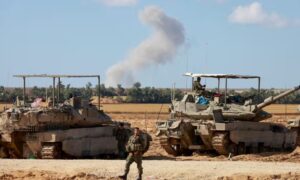Israel Deploys Troops into Rafah Amid Rising Gaza Strip Tensions
On Monday night, Israeli forces entered Rafah, taking control of the primary border crossing connecting Gaza and Egypt. Meanwhile, efforts by international mediators to sustain negotiations aimed at resolving the conflict faced challenges.
The Israeli army said it had taken “operational control” of the Rafah border crossing at Gaza’s southernmost point on the Palestinian side with tanks and infantry backed by heavy airstrikes
“This is a precise and limited operation . . . within specific areas of eastern Rafah,” said an Israeli military official.

The attack came just hours after Hamas announced it had accepted a multi-phase ceasefire brokered by Egypt, Qatar, and the United States for the hostages.
The agreement would have resulted in an initial six-week truce in fighting the release of dozens of Israeli hostages held by the group
On Tuesday, Israeli Prime Minister Benjamin Netanyahu repeated his earlier rejection of the Hamas-backed proposal, saying it was “very far from Israel’s necessary demands” and “intended to torpedo our forces’ access to Rafah.”
He said, however, that Israeli negotiators are still traveling to Cairo for further talks and “will continue to press for the terms of the release of our hostages.”
Netanyahu has said in recent days that the attack on Rafah, home to more than a million displaced Palestinians, will be carried out without a deal to free Israeli hostages. They were captured by Hamas during an attack on southern Israel in October. 7 that started the war.
Throughout Monday, the Israeli army called on civilians sheltering in eastern Rafah to evacuate the area. The United States and the United Nations have warned of serious humanitarian consequences of a military attack in such a densely populated region.
On Tuesday, aid organizations also expressed concern about the impact that Israel’s takeover of the Rafah border crossing, which has temporarily halted aid supplies, will have on humanitarian aid to Gaza. The isolated area has been suffering from basic needs, including food, for months.
Netanyahu said Tuesday that taking control of the Rafah crossing is “an important step toward destroying Hamas’ remaining military capabilities.”
Another main crossing into the Strip, Kerem Shalom, was also temporarily closed after a Hamas attack on Israeli soldiers near the border over the weekend. Jens Laerke, a spokesman for the UN humanitarian agency, said that restricting access to fuel for a significant period would “compromise the humanitarian operation”.
The details of what Hamas agreed to in the offer to release the hostages were not immediately clear, but a diplomat briefed on the negotiations said the offer was accepted by Hamas. was broadly similar. international mediators about two weeks ago to propose.
That proposal included demands for an initial six-week pause in the war, during which Hamas would release 33 hostages, including women, children, the elderly, and the wounded.
This will be followed by the extended ceasefire that negotiators had hoped for, during which the remaining hostages will be released. Israel would release Palestinians held in Israeli prisons, allow Gazans to return to their homes in the northern part of the enclave, and allow an influx of humanitarian aid.
Benny Gantz, Israel’s centrist war cabinet minister, said that Hamas’ response “does not match the dialogue with the mediators so far and has serious shortcomings.”
“However, we will continue to turn over every stone and the delegation will go to Cairo” where the negotiations will continue, Gantz said that the White House believes that the differences can be overcome: “Where we see the text now there should be no reason why they cannot bridge the remaining gaps.”
Israeli officials say Hamas is holding 132 hostages and believe 37 of them are dead.
Gaza Strip Rising Tensions
Mediators are facilitating indirect talks between Israel and Hamas on another round of hostage exchanges since the second round in November. The talks stalled after Hamas demanded that any deal end with a permanent ceasefire and the complete withdrawal of Israeli forces from Gaza.
Israeli Defense Minister Yoav Gallant said Tuesday that the Israeli offensive will continue “until we remove Hamas from the Rafah area and the entire Gaza Strip or until the first hostage returns.”
“We are ready to make compromises to get the hostages back, but if that option disappears, we will continue and ‘deepen’ the operation,” he added.
Hamas took about 250 hostages in the October 7 attack, which killed 1,200, according to Israeli officials. According to Palestinian health officials, more than 34,000 people have been killed in Israel’s counterattack on Gaza.
Also read: Bomb threats in Delhi schools: Spark Panic and Evacuations